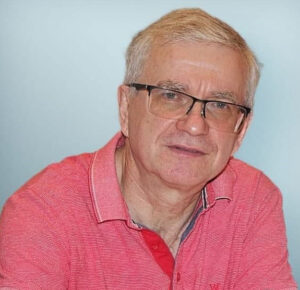
Sergei Shaposhnik was born in 1954 in the village of Polotnyany Zavod, Kaluga Region. Graduated from school number 10 in the city of Petrozavodsk.
Graduated in 1978 from the Moscow Engineering Physics Institute with a degree in Applied Mathematics, in 1982 completed postgraduate studies at the Institute of the History of Natural Science and Technology of the USSR Academy of Sciences (now IHNST of the Russian Academy of Sciences) with a degree in Philosophy of Science and Technology.
In 1982-2019 worked in IHNST as junior researcher, researcher, head of the Scientometric Research Group, head of the Center for Computer Telecommunications, senior researcher at the Sociology of Science Sector, senior researcher at the Center for the History of Science.
Since 2019 he is senior researcher at the Laboratory of Digital Technologies for Regional Development of the Karelian Scientific Center of the Russian Academy of Sciences. At the same time, he worked at the Center for Science Analysis (CSA): in 1991-1996 he was the director of scientific programs. He also worked at the Institute of the Information Society (IIS): from 2004 to the present he is a member of the Board of Directors and head of the Directorate for Information Society Monitoring.
Sergei Shaposhnik conducts an active expert activity: in 2002-2006 he was a member of the Public expert council of the Moscow City Duma on the development of the information society; in 2009-2012 headed the expert section on regional informatization of the Advisory group of the Council under the President of the Russian Federation for the development of the information society; in 2017 he was a member of the interdepartmental working group under the Ministry of Communications and Mass Media of the Russian Federation on the preparation of the draft Digital Economy program; from 2005 to the present he is a member of the editorial board of the Information Society journal.
He was the leader and participant of a number of research projects supported by grants from Russian scientific foundations – Russian Foundation of Basic Research and Russian Humanitarian Scientific Foundation, as well as international projects supported by the World Bank, European Commission, Microsoft, National infocommunication holding “Zerde” (Republic of Kazakhstan). In particular, he was one of the leaders of a research project supported by Microsoft, and one of the co-authors of the book “ICT Competence as a Factor of Socio-Economic Development of Russia” (2012). He participated in several World Bank projects as a consultant: Russia e-readiness assessment (2004); A sector assessment: broadband in Russia (2015). 49 p.); Methodology for Digital Economy Development Assessment as a Tool for Managing the Digital Transformation Processes (2018); Analysis of the current state of development of the digital economy in Russia (2018); Assessment of the current level of development of the digital economy in the Ulyanovsk region (2018).
Sergei Shaposhnik supervised over 30 R&D projects carried out by CSA and IIS on the order of federal and regional authorities (the Ministry of Education, the Ministry of Economic Development and the Ministry of Telecom and Mass Communications of Russia, the city of Moscow, the republics of Mordovia and Tatarstan, the Tyumen and Tomsk regions, the Khanty-Mansiysk Autonomous Okrug – Yugra).
He is initiator and leader of the composite Index of Readiness of Russian Regions for the Information Society, first published in 2005 (currently 7 issues have been published). He also led the preparation of the National Index for the Development of the Digital Economy commissioned by the state corporation “Rosatom” (2018).
Sergei Shaposhnik participated as a speaker in more than 30 scientific conferences and seminars in Russia and abroad, including “UNESCO between the Two Phases of the World Summit on the Information Society” (2005), the Fifth International Conference “Fundamentals of Information Science” (2013), International Congress Smart Russia 2016.
He is author of over 90 published works, incl. in journals from the list of the Higher Attestation Commission of the Ministry of Education and Science of the Russian Federation (37), as well as indexed in Web of Science (3) and Scopus (4).